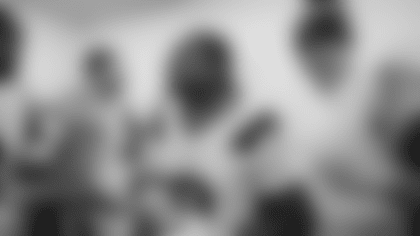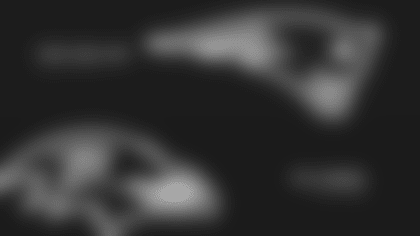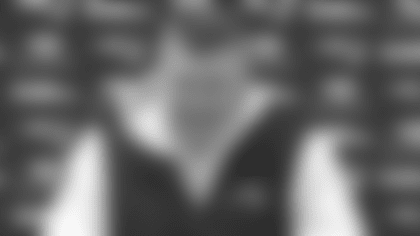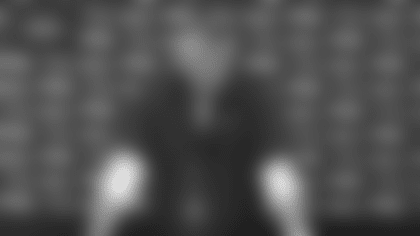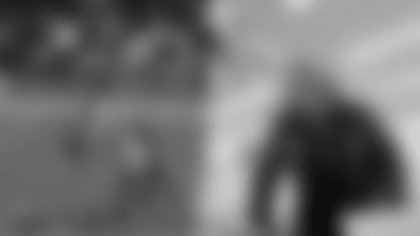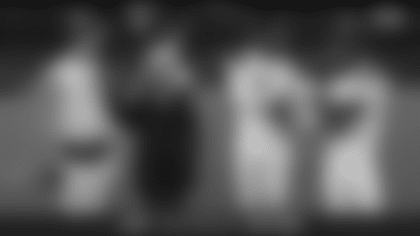S DEVIN MCCOURTY
VIDEO PRESS CONFERENCE
August 27, 2020
Q: Is there anything you want to say before we get into questions?
DM: I've been thinking a lot the last couple of days. I've had so many different emotions of being angry, being sad. A lot of it has really been what I try to talk to young kids about. I've felt very hopeless. I don't have a statement. I don't have anything powerful. It's just been very disheartening, just watching things transpire, watching lives still be lost. And it's not just police brutality; it's everything we deal with. Even today, I'm going to come on here and you're going to ask me questions and it's going to be about my opinions on different things. I just feel like overall until people turn on different things and we watch that and all have the same outlook like, 'Man, what is going on? This is heartbreaking. This is terrible,' it just doesn't matter. I've just felt very hopeless the last couple of days.
Q: Is it hard to come to work? Does it feel like practicing is almost secondary?
DM: I mean, everything is. I think everybody in this locker room has so many thoughts and feelings going on, but I also don't know if we don't practice one day but go back practicing the next day, I don't know what that really accomplishes. I don't know what will be down. I've done a lot of this work over the last couple of years. I've studied things. I've tried to do different things. I know we could take a whole day off and we could talk about a bunch of different things. We have talked as a team. We've done all that stuff. It just hasn't mattered. Obviously, football distracts people from that. But if there was no football, I don't think people are still going to care about black and brown people in our country. I just don't think that will be result of it. Like I said, I've been at a loss of what to do, what not to do, what is acceptable. It was powerful seeing the NBA and all those guys not play, but does it really matter if they go and play? I don't know. I'm not saying they're wrong. I'm just being honest with you. I don't know. I don't have those answers. I don't know what's the right thing to do. It's just been tough. I think all throughout the day, you have emotions of being happy to be out there on the football field. You have emotions of talking about something that has nothing to do about football while we're out there. I think as player and as human beings, we're all figuring out a way to just try to continue to press on.
Q: Did you guys discuss cancelling practice today? Do you have anything planned to do as a team in light of recent events?
DM: Honestly, I haven't even thought of any team aspect. As an individual, like I haven't been able to come to grips with anything, let alone try to be a voice to guys and say what we should or shouldn't do. I don't have that answer. I haven't tried to be the guy in front of anything. I've been trying to handle things from an individual standpoint of trying to understand. I've talked to guys separately just about how I feel and trying to gauge how they feel and trying to make sense, but it's been hard for me individually to even try to say, 'Man, we should do this or we should do that.' Like I said, I've been involved and been a guy that says, 'This is important. Guys, come on, let's do this.' Right now, I don't know if I tell a young rookie, 'we don't need to practice because we need to' – I don't have that answer. I don't know what to tell a young rookie – black, white – I don't care about that. I don't know what to tell them what we need to do next as a team, to help different black and brown people and communities that are struggling. Whether it's police brutality, whether it's education, whether it's healthcare – I don't have those answers to help those people. I don't want to do just something just to do it because everybody else is doing it. I'm still searching within myself for that.
Q: What are your plans for the rest of today?
DM: I don't know. I mean, I would be interested, you know, like how do you guys feel? Like when you guys watch that and you come in here and you ask us questions? Like I know last night, I sat there and I looked at my kids, and the only thing I could think about is I have to tell my kids what my mom taught me as I became a teenager about how to handle being pulled over by a cop, how to conduct myself, what clothes to wear so that when I went somewhere people would think that I had education and didn't think that I didn't know how to speak correctly or that I was intimidating or a threat to them. Like those are the conversations my mom had with me as a young teenager and like I looked at my kids and I was like, 'I have to tell my son, how to act a certain way so people don't think he's a threat and so that he will always be able to come home.' I have to tell my daughter those same things. That just broke my heart last night because I know my mom's mom told her that. And I know my grandma's mother taught her. Dating back hundreds of years, that has been an ongoing conversation in black households. And I sat there last night and I was like my kids are three and two and I was like, I have to try to shield them as long as possible, but eventually, like I have to have that conversation. It's just very tiring like coming in and talking about that. It's just like, it's like whatever. Like we'll move on, the talk will be about practice today. It'll be a little bit about this, but it's just like no one cares. It's just been brutal.
Q: When you feel hopeless about these issues, what has helped you get the hope back in your experience? What do you lean on to take a step in that direction?
DM: I've just been praying. I talked to my mom earlier this morning. I was texting her and just trying to lean on what I know. Just praying on things getting better, praying on the attitude of hope and having faith to just go on, knowing that things improve. It's not up to me to be able to see that. You know, I'm only here to see what's seen. The unseen things that will happen, the things I don't know, is to just lean on that in the future. And I'm working my way towards it. It's just taking some time.
Q: Do you think there's some undue pressure put on athletes to respond to things like this?
DM: Definitely. I think over generations, athletes have taken it and athletes have had a huge voice in change and being a part of that. I saw something Draymond Green posted about why should athletes stop playing and be the only people to stop playing when why doesn't some of the top businesses, whether it's Apple or something like that, why doesn't their CEO stop going to work? Why do we only look for athletes to cancel games and stop going to work? I read that and I was like, man like that's another interesting point. Like, that makes sense. It's just that feeling of right now, as an athlete, almost everything makes sense, but it's just like is that the answer? None of us know that. So, like there's definitely pressure to go out there and do something. Like, right now there's pressure on every team that goes out and practices – like you should be cancelling practices is the theme right now. Or when the anthem comes up, you should be taking a knee for anthem. It's just like, at the end of all of that, if the goal is to help these different people in different areas, if it's to try to get rid of all the systems that are holding or oppressing different people, when we do those things, does that really affect that change? And that's what I think is the issue right now and something we have to try to find.
Q: How much have you talked to guys on other teams?
DM: I have talked to a couple of different people and people have reached out to me. So, it's been a lot of conversation. I think a lot of it, too, is just even before you get to that team aspect, is just trying to understand how guys feel, what they're thinking, and trying to come to terms with that. I think there's been a lot of that across the league. I am sure I am not the only guy that has been talking to friends and different guys in different places. There's definitely some of that going on.
Q: You did not practice today. Did watching from the sideline today have anything to do with current events or was that for a different reason?
DM: That was separate. That's separate.
Q: You mentioned you're not sure what to do. As you look at the big picture, should the league step away for a little bit? Do you want more ownership involvement to help make your voices even louder?
DM: I think everything should be on the table as far as solutions, but I don't know – like, is that the answer? Even as you think to yourself, like would it mean more to you to hear owners get involved? I can't answer that. I don't know if that would be the change that is needed. For NFL owners to get more involved, I think it would be awesome. I think if we had that across the league — I know here in New England, I've gotten to have plenty of conversations with Mr. [Robert] Kraft about different things. But, I don't know. Would it help people to see Mr. Kraft jumping in front of a camera and say how he feels about the things in Wisconsin? Would that cure all the things that are going on in our country? Would that help the different people in Wisconsin walking around with guns? Who in my eyes, when I watch that, I'm like, 'Dang, that is pretty threatening to see someone walking around with a loaded gun.' But, for some people in Wisconsin, that is not threatening at all. How do we change that? How do we get people to understand the difference of being a Black person and being a White man — a Black man and a White man? Why can't they be seen as equal walking down the street? If one has a gun, that could be threatening, but the one who doesn't have a gun if he is Black might be more threatening to someone. I don't know if having ownership behind us makes that voice louder. I think we are at the point in our country where we've had the most eyes, awareness that we might have ever had. You're talking about 2020 with social media and all the different outlets over the last couple of months — people have been talking about this nonstop. So, I don't know. I couldn't give you a straight answer. If we all boycott Week 1, will that solve the problem? I don't know, because does it matter if all come back to play Week 2? I think everything should be on the table. I am not saying that those aren't solutions. It's just hard. It's just hard right now. I have gotten the opportunity to be around a lot of really smart people and I will continue to try to lean on them and always try to brainstorm with a lot of different individuals.
Q: Where does it need to start? Even if you're talking to your kids at a young age about this, that doesn't mean that other people are talking to their kids to really help create change. Where does it need to start so that everything can be equal?
DM: I have been reading Tony Evans' book called 'Oneness Embraced,' and he talks about all that — kind of goes through Biblical times and the history of the country. It always comes back to just humanity of everyone understanding that we are all humans. It is so easy to say that, but when something has been engrained and taught for so long and systems in place that just don't view things like that – and you've seen that – if we replace different people in different positions and if we put a new person in, it just doesn't change anything. Where do you start? I don't know. I have no idea where you start. For each individual, you have to look within yourself and decide for yourself what you want to do. But, like you just said, does that solve the issue for if you teach your son one thing but he goes out in the street and someone who has taught their son something totally different, does that help your son in that situation? I don't know, because all you care about is that your son comes home and he's safe and sound. Or does it help a kid who grows up in a lower income area that he won't get the same education? If his mom tells him that, does that help him advance in life? Does that help her advance? No. I definitely think you have to start individually, but I have been starting to question even if you do that, does that fix all the different systems that are already in place?
Q: Based on what we've seen, even in the last few does, does it feel like things are almost getting worse to some degree?
DM: You say that and right away I think of the football term that every coach has always said to me: 'If you're not getting better, you're getting worse.' There's probably some aspect of that, because the more we see all of these different tragic events happen, you become numb to it. I am like everybody else and that is why I caught myself yesterday, or a couple of days ago, and I see the video and I am like, 'Well, dang, what did he do? How did this get to that?' It's just like, we leave out when you turn on that video, you are watching humans. Like, this isn't a movie. This isn't a video game. You're watching real life. You are watching someone get shot in the back seven times. This is real. You're watching a kid walk around – not someone trained – but you're watching a 17-year-old kid walk around with a deadly rifle. It's like a video game and there are people running around and this is what we watch on TV. So like, when you just think of a natural way life goes, if things don't get better, yeah, they will start to get worse. Because each time an incident happens, you are like, 'Well, why didn't we learn from the other incident?' So, in your brain, as those things keep happening, it gets worse and then you become numb to it and then it just becomes the norm. That is one of my biggest fears is that someday this continues to just happen and people get tired from yelling from balconies or going and making statements or trying to help and they just become numb to it and it just becomes normalized.
CB JASON MCCOURTY
VIDEO PRESS CONFERENCE
August 27, 2020
Q: What went into the decision to go through with practice?
JM: I don't know. I feel like right now, myself, and I know a lot of other guys I've talked to in the locker room right now, we're just lost, man. It's almost like a sense of hopelessness. In March, we had a team discussion, via Webex, and we all talked about it, and here we are, months later, and we're talking about the same exact thing. And it's like, 'Alright, do we cancel practice?' But if we cancel practice today on a Thursday, do we cancel practice tomorrow on Friday? What's going to get us to go out and practice the next day? If we cancel practice today, we sit around, we discuss race, we discuss what happened to Jacob Blake, or we talk about what's continuing to happen in our country for hundreds of years, but then we go out and practice tomorrow, nobody cares. I think, for us, right now, we're trying to figure it out. And I know, for myself, you feel a sense of responsibility. I know the neighborhood I came from wasn't the greatest. I know there's a lot of people that look like me that are still in that same neighborhood, and there's a lot of people in neighborhoods right here in the New England area that are suffering, and we're all hurting when we see what took place in Wisconsin. It's not just black and brown people. As human beings, as Americans, we should all watch the video — whether somebody was a former criminal or had a violent past, whatever all that stuff that the discussion is, it doesn't matter when you turn on a video and you watch human life being shot in the back seven times. That stuff becomes secondary. I think we all need to hurt. We all need to feel devastated. I have three young children and I have no idea how I'm going to explain to them, 'Hey, you're not perfect. You're going to make mistakes. We're believers. We have strong faith. Jesus is going to figure, and you're going to be able to redeem yourself,' and then you watch videos, like, yeah, some people might have made a mistake, some people didn't, but they're in the position they're in. Is a mistake worth being shot seven times? Is it worth being kneeled on until you take your last breath? I think for us as players, we're lost. We don't know why we're practicing. We don't know why we would've not practiced. We don't know why we would be preparing for games. We don't know why we wouldn't. We're completely lost as Americans. We have no idea what's the way to go. I mean, we saw last night NBA players not play, you hear reports now that two of the teams don't want to play, the rest of the teams do, we're all lost. We have no idea what's the right move. What can I possibly do to change the system that's been in place for so many years? To be honest, to answer your question, I have no idea why we went out there and practiced today. I feel like we all just go through the motions. We feel like, hey, we have meetings starting at 7:15 and we wake up and we go to 7:15 meeting carrying every emotion, every tear with us, and not knowing how to deal with it at all. We just kind of go through the motions because it's routine. We've all become so numb to this because it's happened so many times and in so many different places that we're all just confused. There's a sense of hopelessness of just not knowing or understanding how to fix a problem.
Q: How can you lean on your teammates to try to find some guidance? How much of that have you done or is it that your lost in your routine right now?
JM: We're all discussing it, in and out, throughout the day. I know a lot of us battled today whether we should go home or whether we should sit around and talk. We just don't know the answers. I texted my wife this morning when I got into the building, and I was just like, 'I feel guilty. I just don't feel right.' There's just a feeling inside me, there's hurt inside of me, there's anger inside of me. And I'm like, 'Does football mean anything'? I talked to [Brandon Copeland], and obviously he was a professor, and he said some of his students have hit him up and were just like, 'What's the purpose of getting ready to go to college?' I think there's just so much emotion that goes on with everything that we've seen over the last few days. We watch a man shot seven times in the back and then we watch a 17-year-old kid go out and feel like he needed to take matters into his own hands, killing two people, and walked by the cops with a long gun around his neck with his hands up and get in his car and drive all the way back to Illinois before anything is done. We listen to the Chief of Police say, 'Well, none of this would have happened if everybody had been inside for the curfew.' It's just saddening. We're definitely trying to lean on each other, but we don't have the answers. We have no idea what it is we have to do to fix this problem. But I think a lot of us — and I won't say everyone because I know everyone probably doesn't feel the same way I do. Some people don't see it as their issue. I've had people hit me up, I've had white friends hit me up and say, 'Hey man, I support you, whatever you need.' And it's just like, 'Hey, I need for this to be everybody's problem. I need for it to not just be my problem because the people that are going through it look like me. I need it to be all of our problems because we're all humans.' We all should realize the significance of a human life and how we all should be treated. I think we're just struggling with this, man. We don't know how to move forward, so we just stick to our routine and we move and we go through the motions. For me, it's when I get home, I'm trying to discuss it with my wife, obviously, Dev's here, me and him are extremely close, we're trying to bounce ideas off each other, but there's just so much emotion swirling around. It's just so hard to decipher right now.
Q: Do you get any respite by going to your job or does it make it hard to do your job?
JM: It definitely makes it hard to show up. We learn how to compartmentalize and when we get on the field today and practice, you get going and you're a competitor as well and you get lost in football. I think sometimes that can be a good thing because it allows you the freedom to go out there and just be who you are and do what you love, and I think as soon as it's over, you're right back to reality. It's almost a sense of guilt that, hey, I'm able to go out there and I'm able to escape what's really going on here. For Jacob Blake's three children, who sat in the car and watched their father get shot seven times, where do you go to escape that feeling? Where do you go to erase that sight? Where do you go to deal with that type of trauma? It's a feeling of guilt when you walk away. I think that's probably the main thing that I was suffering from today, is of guilt that I get to walk into the building and I get to go play football. Because the reality is, I can be anywhere and as soon as I'm out of the building or there's not a football in my hand, I'm just a black man on the street. I look a lot like some of the men who have lost their lives, who have been gunned down in the streets. The reality of the matter is I'm blessed to be able to do what I can and to have this platform. For me, I'm going to try and do everything that I can to use that platform to help those who don't have the ability to spread their voice that people will hear them. Yeah, you're definitely able to get away from it and to be able to love your craft and work at it and build as a team and all of that good stuff. But there's a sense of guilt that comes with it. It's just not reality. Because we get to go out there, whether it's practice or whether it's a game, it's a few hours out of the day, but I have a seven-year-old and, at some point, she's going to see these types of videos and she's going to wonder, she's going to ask me, 'What's going on, Daddy? What am I supposed to do if I'm in that situation? What if my brother is out there and this happens to him? How should he handle himself?' Everybody doesn't have to have those conversations. Everybody doesn't have to sit down with their son and explain to him if he's ever pulled over while he's driving, that he needs to roll every window down in his car, that he needs to make sure his license and registration and insurance are already visible, he needs to keep his hands on the steering wheel at all times, he needs to announce any move that he's getting ready to make before he makes it. Everybody doesn't have to have that conversation, and I do, and I'm going to have that one day. And it breaks my heart because my parents had to have that conversation with me, and my grandparents had to have that conversation with my parents. At what point, at what generation, do we get to stop having those conversations? Do we get to all feel normal and feel safe in a country where we say we all are free and we all are equal? When we look around, we know that's not the case.
Q: Do you think it would be helpful to set aside some time as a team to talk?
JM: We've done that in the past and we plan on doing that. I don't know. I talked to Duron [Harmon], I know they did that in Detroit and they kind of started it. I thought what they did was awesome. Does it fix anything? When we cancel practice and we sit down and we meet and we talk, does it change anything? When we stay inside for the National Anthem and then we go out there and we play in the game for four quarters and we entertain everybody, does it change anything? I think that's what I'm struggling with. We cancel practice and we sit down and talk. Does Thursday practice just move to Friday? Does everybody write a story on Thursday that the Patriots canceled practice and then tomorrow the headline is, 'Cam Newton thrills at practice' and then we just go on and we talk about what happened that day? Who's out who's injured, who came back, who had an interception, who broke off a nice run? It just moves forward. It's just like, 'Yeah, that was awesome they canceled practice, they did something, but, oh, they came out to practice the next day and that's what we're going to write about and that's what we're going to discuss.' I remember the opening press conference where Dev spoke and he didn't take any questions and he just talked about what's going on in our society and at the end, he addressed the NFL and the opt-out date. I went on Twitter after that and the thing I saw most was, 'Devin McCourty bashes NFL and the opt-out date.' Nothing said Devin McCourty addresses Breonna Taylor, Devin McCourty talks about equal rights for everyone, Devin McCourty talks about voting. It wasn't about that. It was about the NFL. I feel like when you see players on the Lakers and the Clippers who have said, 'Hey, we just don't think we should play this game,' and they're trying to get the attention, but then, I read something from Draymond Green and it was just like, 'As athletes, we always feel the need that we need to stop playing to make change, but at the end of the day, we play a sport that's also a business.' How many other businesses do you see being shut down right now? Do you see the CEO of Apple or YouTube or Google saying, 'Hey, we're shutting down. We're boycotting going to work. We're not going to do this anymore.' So it's a struggle because at moments I feel like, man, screw this. I'm not going out there to entertain anymore when I feel the way I feel. And is that the right thing? Does that do anything? Is that fair? It's been a ridiculous struggle. You tweet something — prayers up for Jacob Blake for what he's gone through and his family — and you go look at his mentions and you have to laugh at it. It's just like, how can you watch that video and the only thing you can think about is, 'He was a criminal or he did this or he did that?' Just because is saying prayers up for him, we're not — I don't know the man. I don't know who he is, but I watched the video for it and I feel for it. It hurts me to watch. It's just tough, man. It's extremely tough. I know I'm rambling because I don't really — my emotions are everywhere as well.
Q: You weren't on the media schedule as expected to speak today. Do you feel that burden and how do you navigate that?
JM: I definitely feel a sense of responsibility to the guys in my locker room, to my peers that play this sport, but more importantly to my community, the community in which I grew up in, the community in which I'm playing in and represent, I definitely feel a sense of responsibility to try to be a voice for them. For every negative comment you see on social media based upon standing up for something, there's somebody from back home that's telling me, 'Hey, I'm proud of you, man. Continue to do what you're doing.' Of course, you don't do it for that, but sometimes it's tough, man. You need that motivation to continue to tell you that, 'Man, I need to fight. I need to fight.' Because this isn't right and it hasn't right. For sure, me alone, me, Dev, Slate [Matthew Slater], whatever the group is, are we going to change the world? No, not at all. This system has been built over hundreds of years, it's not going to be a few guys on the Patriots that play football that's going to embark a change on a system that's automatically going to go to being equal and fair to everybody. But I do feel like we've been blessed and we've been placed in the situations we're in to make a difference. That's not just chasing after Super Bowls. It's bigger than that. When you realize that, it allows you to continue to move forward and continue to fight for what you feel is right. I've just told myself throughout all of this to pray, to pray what is the right move to make, what are the right words to say, and, at the end of the day, do what I feel is right. I discuss it with my wife every single day and when I go home and she can look at me and say she's proud of me and my kids, that's what's going to matter to me. I just feel like I have to say something. Somebody does. There's been so many people that have spoken out and continue to speak out and will continue to speak out, no matter what the outcome is for themselves personally. We all have to do something. I think yesterday was the day that marked four years since [Colin] Kaepernick first took a knee. You just think about the backlash that that was met with, the feelings of hostility toward him, and the statements that were being said about him, and four years later, you look at what we're going through in our country, and it's not new. It's not like when he took a knee four years ago, it just started. A little bit of me is like, 'Wow, is this just a trend? So now, everybody wants to speak up.' But the other side of me is like maybe it's an awakening. Maybe now more people realize what's going on isn't right and whether they were asleep at the switch back four years ago when Kaep took a knee, I'm not going to blame them. But you now see that there's an issue going on, and you can be a light to maybe strive toward a solution, I think it's everybody's responsibility to say something and do something.
RB JAMES WHITE
VIDEO PRESS CONFERENCE
August 27, 2020
Q: What is your reaction to the NBA'S decision not to play yesterday, and if there have been any discussions internally?
JW: I think it's extremely powerful what the NBA did. It takes a lot of courage, especially during the playoffs, and all the hard work it took for them to get the bubble started. For them to realize there's so much going on in the world, there's so many more important things than basketball especially at this time. For those guys to realize that and try and take charge, and do whatever they can to grab that attention, and to kind of try to demand change in this world… It stinks to keep seeing these things happen over and over and over again. To see them on social media every other week, we just have to do better as a country. We have to do better as people. We just have to treat each other better, all these types of things. I don't know what it's going to take, I don't know what the exact answer is, who we need to talk to, exactly. But I think it's very powerful and a good first step what the NBA is doing. We just have to do better.
Q: Have there been any discussions about what actions you might take as a team?
JW: Not yet. We talked about it a little bit in the locker room. I'm sure we'll continue to discuss it and figure out ways that our voices can be heard and ways we can impact the communities around us, the communities where we're from. We have a platform by playing football. We need to use it properly and like I said, try and demand change.
Q: Some NFL teams decided not to practice today. Was that ever a thought by the players, as you discussed what went on across the country?
JW: I mean, there's a lot of thoughts running through a lot of guys' minds. It might not have necessarily been about not practicing today, but we will continue to discuss things as a team and figure out what's best, and how to get our voices heard, and come together as a team and figure out what's best to make an impact in a positive way in this world. We just need more positivity, more good light, and spread a lot of good energy and a lot of positivity in this world. I think that's what the world needs to see.
Q: Is there difficulty in playing and going through this? Is it hard to balance what's going on, and playing?
JW: It can be tough. It hurts to keep seeing these things happen over and over and over again. There's a lot more important things going on in the world than sports. We have a huge platform and it's important that we use it properly and try and help use our voices to speak for those who are marginalized, and don't get their voices heard who go through the struggle each and every day that I may not see, or many other people may not see. But there's really people out there going through things like this each and every day that's not getting caught on camera. We're trying to speak out for those people to try and make the world better for them.
Q: How much mental space is this taking up for you?
JW: It takes up a lot, honestly. It hurts just to keep seeing these things, especially with social media being more prevalent, and camera phones, people are catching a lot of this stuff on camera, more than ever before. It's not like it wasn't happening before, it's just now, things are being seen by the whole world, now. These things have been going on for a very long time. People have been speaking up for a very long time. But I think now more than ever, more people are speaking about it. I think that's great. Just trying to have those tough conversations, talking to people, just trying to figure out what's best to do, and it's tough. Sometimes you feel stuck, you don't know who to talk to, you don't know what to do. But I think guys and girls across all sports are trying to do whatever they can to make an impact, make a change. I think a lot of people truly care, it's not just one subject, it's not just police brutality, there's so much going on, more than just that. There's so many issues that need to be tackled. Sometimes you just don't know where to start. I think this is a great beginning, grabbing everyone's attention, the NBA not playing their playoff games and the thing is, the NFL, we have to figure out a way to make an impact, as well."
Q: How proud were you of the Detroit Lions, your former teammates, and what they did?
JW: That was awesome, that was huge for them to cancel practice and spend the whole day speaking on that subject. I know a lot of guys were emotional about it, some of our old teammates, Duron Harmon, Trey Flowers, and guys like that. I think that was huge. I think it's just the beginning. A lot of people care about this subject. The more we can continue to talk about it, things hopefully will turn for the better.
Q: Has anything like this ever happened to you, where you've been unfairly judged, growing up, in college, or even recently?
JW: For me, no, not exactly like some of these situations that have been going on right now. It doesn't necessarily have to be getting shot by police, and things of that nature. It can be being followed in a store, things of that nature, just being judged by the color of your skin, and not the person you are. These are things people deal with on a daily basis. It doesn't have to be just myself. Just seeing these incidents going on, knowing that could be my brother, that could be my dad, that could be my cousin, that could be one of my best friends. It just hurts. Every time I see these situations, I think what if that's someone I truly care about. It hurts, man. You don't ever want to see anybody have to deal with these situations. It's just not right. We have to be better, we have to do better as people. People have to change their actions, change their hearts, just find a way to make better judgment.
Q: You've been a big supporter of the student movement at the University of Wisconsin on Twitter. Have you been in communication with them at all?
JW: I have. One of my best friends works at recruiting at Wisconsin. He keeps me involved with things they're trying to do there, trying to create a more diverse campus, trying to help make the campus more diverse with more minority students. I think that will be huge. Wisconsin is a majority white school, a majority white people on campus, so to make it a more diverse campus will be a great start, for sure. But to see those young athletes, they want to try to make a difference in a positive way, and try to help those who may not be getting the opportunities they should, or marginalized, have them get into college and further their education like the rest of the people in the world. It would be a huge deal, and something that would be great for the university.
Q: Just one football question: How does it feel where you are in camp right now? Are you where you need to be without the preseason games?
JW: We just have to continue to progress, like I've been saying. It's a crunch schedule. We're a couple weeks out from the first game, so each and every practice has to be meaningful, each and every meeting, each and every walkthrough has to be meaningful. We're on a crunch schedule. Guys are doing the best they can to be in shape, take care of their bodies, get that contact in. You're not going to play a full game, like you may have had a chance to in preseason. So to do as best we can, getting those full-speed reps in, trying to make it translate as much to a game as possible so in a few weeks, we'll be ready to go."










